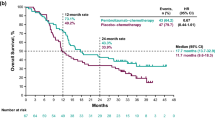Abstract
In this double-blind study, the efficacy and safety of a single intravenous dose of a novel antiemetic, granisetron, was assessed at two dose levels (40 μg/kg and 160 μg/kg). A group of 355 patients were given prophylactic granisetron prior to receiving highdose cisplatin chemotherapy. In the first 24 h, 57% and 59% of patients, respectively, experienced no vomiting and no more than mild nausea. Two further doses of granisetron (40 μg/kg) were permitted in the first 24 h to treat any emergent symptoms of nausea and vomiting; 66 patients (39%) in the 40-μg/kg treatment group and 56 patients (34%) in the 160-μg/kg group received at least one additional dose. Additional treatment with granisetron resulted in resolution or improvement of symptoms in at least 73% of these patients. Over the 7-day study period, 52% of patients in the lower-dose group and 48% in the higher required no further conventional antiemetic therapy. The two different dose levels were equal both in terms in efficacy and safety. Granisetron was well tolerated throughout the dose range of the study [40–240 μg kg-1 (24 h)-1]. The commonest adverse event was headache, seen in 14%–16% of patients. In all but one case this resolved spontaneously or responded to simple treatment.
Similar content being viewed by others
References
Aapro MS (1991) Controlling emesis related to cancer therapy. Eur J Cancer 27:356–361
Andrews PLR, Hawthorn J (1988) The neurophysiology of vomiting. Baillièrs Clin Gastroenterol 2:141–168
Andrykowski MD, Redd WH, Hatfield AL (1985) Development of anticipatory nausea — a prospective analysis. J Consult Clin Psychol 53:447–454
Andrykowski MA, Jacobsen PB, Redd WH, et al (1988) Prevalence predictors and course of anticipatory nausea in women receiving adjuvant chemotherapy for breast cancer. Cancer 62:2607–2613
Bermudez J, Boyle EA, Miner WD, Sanger GJ (1988) The anti-emetic potential of the 5-hydroxytryptamine3 receptor antagonist BRL 43694. Br J Cancer 58:644–645
Bressler L, Schor J, Blazer D, et al (1986) Safety and efficacy of prolonged high-dose metoclopramide: a pilot study. Proc Am Soc Clin Oncol 5:250
Cassidy J, Raina V, Lewis C, et al (1988) Pharmacokinetics and antiemetic efficacy of BRL 43694, a new selective 5-HT3 antagonist. Br J Cancer 58:651–653
Chabner BA, Myers CE (1985) Clinical pharmacology of cancer chemotherapy. In: Devita VT Jr, Hellman S, Rosenberg SA (eds) Cancer: principles and practice of oncology. Lippincott, Philadelphia, pp 287–328
Chevallier B, on behalf of the Granisetron Study Group (1990) Efficacy and safety of granisetron compared with high-dose metoclopramide plus dexamethasone in patients receiving high-dose cisplatin in a single-blind study. Eur J Cancer 26 [Suppl 1]: S33-S36
Fetting JH, Wilcox PM, Iwata BA, et al (1982) Anticipatory nausea and vomiting in an ambulatory medical oncology population. Cancer Treat Rep 66:1601–1604
Gralla RJ, Itri LM, Pisko SE, et al (1981) Anti-emetic efficacy of high-dose metoclopramide — randomised trials with placebo and prochlorperazine in patients with chemotherapy induced nausea and vomiting. N Engl J Med 305:905–909
Gralla RJ, Tyson LB, Kris MG, Clark RA (1987) The management of chemotherapy-induced nausea and vomiting. Med Clin North Am 71:289–301
Granisetron (data on file) SmithKline Beecham, Welwyn Garden City, Hertfordshire, UK
Kris MG, Tyson LB, Gralla RJ (1983) Extrapyramidal reactions with high-dose metoclopramide. N Engl J Med 309:433–434
Kris MG, Gralla RJ, Clark RA, et al (1985) Incidence, course and severity of delayed nausea and vomiting following the administration of high-dose cisplatin. J Clin Oncol 3:1379–1384
Laszlo J (1983) Emesis as limiting toxicity in cancer chemotherapy. In: Laszlo J (ed) Anti-emetics and cancer chemotherapy. Williams & Wilkins, Baltimore, pp 1–5
Miner WD, Sanger GL (1986) Inhibition of cisplatin-induced vomiting by selective 5-hydroxytryptamine M-receptor antagonism. Br J Pharmacol 88:497–499
Morrow GR (1982) Prevalence and correlates of anticipatory nausea and vomiting in chemotherapy patients. J Natl Cancer Inst 68:585–588
Roila F, Boschetti E, Tonato M, et al (1991) Predictive factors of delayed emesis in cisplatin treated patients and anti-emetic activity and tolerability of metoclopramide or dexamethasone. A randomised single-blind study. Am J Clin Oncol 14:238–242
Soukop M, on behalf of the Granisetron Study Group (1990) A comparison of two dose levels of granisetron in patients receiving high-dose cisplatin. Eur J Cancer 27 [Suppl 1]:S15-S19
Wilcox PM, Fetting JH, Nettesheim KM, Abeloff MD (1982) Anticipatory vomiting in women receiving cyclophosphamide, methotrexate and 5-FU (CMF) adjuvant therapy for breast carcinoma. Cancer Treat Rep 66:1601–1604
Author information
Authors and Affiliations
Consortia
Additional information
on behalf of the Granisetron Study Group
Rights and permissions
About this article
Cite this article
Soukop, M., Granisetron Study Group. A dose-finding study of granisetron, a novel antiemetic, in patients receiving high-dose cisplatin. Support Care Cancer 2, 177–183 (1994). https://doi.org/10.1007/BF00417477
Issue Date:
DOI: https://doi.org/10.1007/BF00417477




